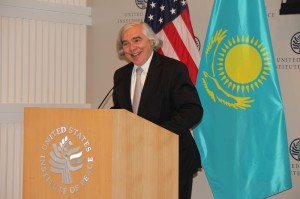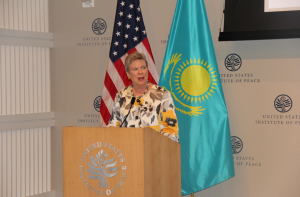Conference in Washington Marks Fifth Anniversary of United Nations Day Against Nuclear Tests
By Daniel Massow
WASHINGTON, D.C.– U.S. Secretary of Energy Dr. Ernest Moniz said Sept. 15 that the world will be a safer and more secure place if nuclear testing is relegated to the pages of history.
He was among several eminent speakers at a special event organised by the Kazakh Embassy in the U.S. and its American civil society partners to mark the annual United Nations Day Against Nuclear Testing and to discuss the importance of the Comprehensive Nuclear Test Ban Treaty (CTBT). The forum was called “Nuclear Weapons Testing: History, Progress, Challenges” and was symbolically held at the U.S. Institute for Peace.
Addressing a full auditorium and viewers who watched the event via webcast, Moniz admitted that there was a time when an active and robust United States nuclear explosive testing programme was necessary, but that time is more than 20 years in the past. The United States, Moniz said, remains committed to the ratification and entry into force of CTBT, along with the monitoring and verification regime.
A multilateral treaty adopted by the UN General Assembly on September 10, 1996 to ban all nuclear explosions in all environments for military or civilian purposes,CTBT has not entered into force due to the non-ratification of eight specific states, namely China, Egypt, India, Iran, Israel, North Korea, Pakistan and the United States. The United States has signed CTBT, but not ratified it; there is ongoing debate whether to ratify the treaty.
Highlighting Kazakhstan’s leadership in nuclear security, Moniz said that “today’s conference is just the latest example in a long line of important successes.”
He reminded the audience that on Aug. 29, 1991, the Semipalatinsk nuclear test site in Kazakhstan was shut down by a unilateral presidential decree. “In the 20 years since President (Nursultan)Nazarbayev’s dramatic decision, the United States and the Republic of Kazakhstan have worked together closely to achieve our shared nuclear security goals,”said U.S. President Barack Obama’s top energy official.
This collaboration, achieved with the support of many international partners, has helped eliminate or remove Kazakhstan’s nuclear stockpile of more than 1,400 nuclear warheads inherited after the dissolution of the Soviet Union and has led to the removal of hundreds of additional missiles and bombers.
Moniz praised Kazakhstan as one of the United States’“strongest partners in nuclear nonproliferation.”
Indeed, Kazakhstan-U.S. collaborations have resulted in major accomplishments such as Project Sapphire, under which 600 kilogrammes of highly-enriched uranium was removed from Kazakhstan, and the safe shutdown of Kazakhstan’s plutonium production reactor at Aktau.
Kazakhstan’s government agencies are currently working with the U.S. Department of Energy to minimise the use of highly-enriched uranium in civilian applications, cooperating to establish a nuclear security training centreand conducting ongoing work to enhance Kazakhstan’s ability to prevent illicit trafficking in nuclear and radiological materials.
Moniz also noted that Kazakhstan had been the driving force behind the annual UN International Day Against Nuclear Tests held on Aug. 29. “Moreover, Kazakhstan helped lead the effort to create the Central Asia Nuclear Weapon Free Zone … and the United States was pleased to join with the other NPT nuclear weapons states and sign the protocol to the treaty this past May in New York,”he added.
In tune with the initiative put forward by Nazarbayev in 2010 at the Nuclear Security Summit held in the city and urging the adoption of a “Universal Declaration of a Nuclear Weapons Free World,”Moniz highlighted Obama’s strong commitment to reduce and eliminate nuclear weapons, including through ratification of the CTBT. He stressed that the United States “looks forward to continuing to partner with Kazakhstan to strengthen nuclear security around the world and pursue our shared vision for a world without nuclear weapons.”
Other U.S. speakers at the conference included Rose Gottemoeller, Under Secretary of State for Arms Control, Lieutenant General Frank G. Klotz, USAF (Ret), Under Secretary of Energy for Nuclear Security and NNSA Administrator, and Andrew C. Weber, Assistant Secretary of Defense for Nuclear, Chemical and Biological Defense Programmes.
In the early 1990s, Weber was personally involved in the above mentioned secret project while serving as a diplomat at the U.S. embassy in Almaty. He praised Nazarbayev’s decision to “seek prosperity and security by eliminating the nuclear arsenal.”
Weber spoke extensively about “the incredible success” of the Degelen Mountain Project, which was announced at the 2012 Nuclear Security Summit as a trilateral effort among Kazakhstan, Russia and the United States to secure vulnerable nuclear material at the former Semipalatinsk test site.
When asked to rate the U.S.-Kazakhstan partnership on a scale of 1 to 10, the Pentagon’s top weapons of mass destruction expert gave it the highest grade. But he added that Kazakhstan’s leadership is more important than an evaluation by the U.S. government. “From Kazakhstan’s side, it hasn’t been simply words but actions and results, from Project Sapphire and the Degelen Mountain to the closure of an anthrax factory in Stepnogorsk,” he added.

Andrew C. Weber, Assistant Secretary of Defense for Nuclear, Chemical and Biological Defense Programmes
It is very compelling, said Weber, “when Nazarbayev cites his own country’s experience backed by actions, leadership and moral authority” as an example for countries like Iran. “He (Nazarbayev) has truly made Kazakhstan more secure and safer,” Weber said.
The conference also heard Dr. Lassina Zerbo, who heads the Preparatory Commission for the Comprehensive Nuclear Test Ban Treaty Organisation (CTBTO). In his address, Zerbo praised the Kazakh government for putting together this important conference on U.S. soil. He warned the audience of “treaty fatigue” and explained that “we cannot sustain having the treaty not in force.” He emphasised the importance of the engagement of the countries, including Kazakhstan and the United States, which have been instrumental in supporting the establishment of the treaty’s verification system.
Kazakhstan, in particular, has been a firm supporter of CTBT. It was among the first countries to sign the treaty in 1996 and five international monitoring stations – part of the world-wide global alarm system to detect nuclear explosions – are located on Kazakh territory.
The conference also featured a short documentary about the horrific consequences for the Kazakh people produced by The ATOM Project, an international initiative launched by Nazarbayev to build global support for a permanent end to nuclear weapons testing and the total abolition of nuclear weapons. Seeking to galvanise global opinion on the need to do away with nuclear weapons, it urges people around the globe to sign the petition today to stop nuclear weapons testing.
An emotional but powerful presentation on the human and environmental costs of nuclear testing in Semipalatinsk was given by Dr. Togzhan Kassenova, nuclear expert at the Carnegie Endowment for International Peace Nuclear Policy Programme. Speaking to journalists after the event, Kassenova,a native of Kazakhstan, said nuclear testing at the Semipalatinsk nuclear test site is “a raw subject” for her as a scholar, stressing that the nuclear testing tragedy remains an open wound for her country.
The conference was organised by the Kazakh embassy in co-sponsorship with Green Cross International, the Arms Control Association, The ATOM Project and the Canadian embassy in the United States. It gathered some 200 arms control experts and nuclear scientists who praised the organisers for pursuing the cause of raising awareness of the long-term dangers of nuclear testing, including at former nuclear test sites such as Semipalatinsk, and promoting a permanent end to all nuclear testing.


